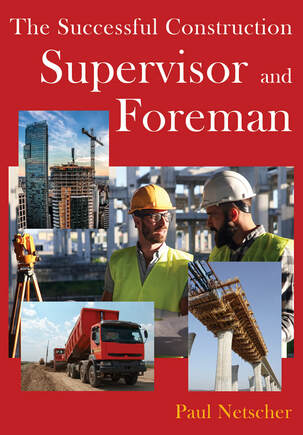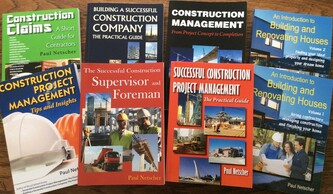Is your Construction project making money or losing money? Several years ago, our monthly cost reports on one construction project showed we were losing money on concrete materials. The matter remained unresolved and the losses mounted. Furthermore, our progress was often held up due to a lack of cement. With a little research, I found that we had paid $500,000 extra for cement - effectively we had paid $500,000 for cement we hadn't used! Further investigation revealed that the drivers of the cement trucks were discharging, and selling 30% of each load of cement before they ever reached the project. Over several months the cement truck drivers had stolen half a million dollars of cement. This resulted in a shortage of cement because the project wasn’t receiving all the cement they were supposed to get, which delayed the project. The above example illustrates the importance of monthly cost reports. Without them, these problems could have gone undetected. Forever. But, cost reports are useful in other ways. For example, one company I worked at built several cooling towers, and each time we lost money. No matter how we priced or planned these projects we always lost money. We never seemed to have the right price or construction methods. We eventually decided we couldn’t make money on these projects and avoided pricing them again. Sometimes we have to accept that we’re not particularly good at some construction projects and we should leave these projects to other contractors. Why are construction project cost reports vital?Monthly cost reports are useful for a number of reasons:
Conclusion This article was first published on the ClockShark website. To visit this website and continue reading the article click on the link above. Please share this post To read more about the author’s books and find out where you can purchase them visit the pages on this website by clicking the links below:
To read more about the author visit the page 'Paul Netscher' Want to contact Paul Netscher please enter your details on 'Contacts' Find out how Paul Netscher can help you
1 Comment
What construction projects should you be pricing? Image courtesy of stockimages at FreeDigitalPhotos.net Image courtesy of stockimages at FreeDigitalPhotos.net Some contractors are like some actors. They sign up for every project that crosses their desk. This often means that the estimating team works long hours and price estimates are rushed. Little thought is put into ways to make the price more attractive to the client. When pricing is rushed it could result in errors with the price, which could mean that the price is too high, so the company doesn’t win the work anyway. It could also result in the contractor not winning the project. Often it takes more than just having the lowest price to be awarded a construction project. In addition, contractors may end up winning the wrong project – one which they don’t have the resources or expertise to complete successfully. Contractors should focus on pricing the right project, then put all their thought and effort into submitting a winning bid. What is the right construction project for your company?Construction projects vary hugely in size, type, location, risks, and clients. Not all projects may be suitable for your company right now. In fact, some construction projects are best avoided if they’re excessively risky or the client is difficult. Picking the wrong project can be disastrous, while the right project can lead to bigger and better projects later. It’s important to understand the project fully when pricing it and be selective about which projects you price. It’s also important to consider the pricing or bidding procedures. If there are multiple contractors pricing the project, your chances of winning the project may be slim. Sometimes there are competitors who have strong relationships with the client, have more expertise in the type of work, or that are already operating in the area. These competitors will have an advantage over your company, and it may be difficult to win the project. Try to pick construction projects that are winnable. Don’t waste time pricing projects that will be nearly impossible to win. Conclusion - win the right construction projectsAll the above points would seem obvious, yet, it’s surprising how often they aren’t considered by contractors as they get caught up in the excitement and possibilities of pricing a new project. After all, what could go wrong? .....Continue Reading.....  This article was first published on the ClockShark website. To visit this website and continue reading the article click on the link above. Please share this post To read more about the author’s books and find out where you can purchase them visit the pages on this website by clicking the links below:
To read more about the author visit the page 'Paul Netscher' Want to contact Paul Netscher please enter your details on 'Contacts' Find out how Paul Netscher can help you New book for construction professionals
Being a construction supervisor or foreman is challenging, it’s hard work, but it’s also rewarding watching projects take shape under your watch. A supervisor’s job is certainly never boring – every day is different, each project is different, different locations and different people, all presenting new challenges.
But, a construction foreman (foreperson) or supervisor is a tough job. Out in all types of weather, facing seemingly impossible deadlines, dealing with people who don’t always have the skills for the tasks, sometimes reporting to project managers who have little understanding of construction, using equipment that breaks down on occasion, working long hours, reams of paperwork to fill out, people taking chances, rules and more rules – is it all worth it? Construction foremen and supervisors are at the coalface of every project. Good foremen and supervisors are essential to the success of every construction project and every construction company, indeed, they are valuable assets. A construction foreman, foreperson, or supervisor, manages a work crew, or oversees a section of work. Of course, they can be male or female. Supervisors take on enormous responsibilities. Not only are they responsible for coordinating their team and resources to ensure that the project, and in particular their section of work, is delivered on time and meets the required quality standards, but they must ensure that the resources operate efficiently. Then most important, they’re responsible for people’s lives. They’re responsible to ensure that they, their team, others working on the project and the general public aren’t endangered or injured by activities on the project, or related to the project. In addition, they must ensure that the project is constructed in accordance with the applicable standards and specifications, so that those using or operating the completed facility won’t be harmed in any way. How this book will help construction supervisors and foremen
Most supervisors have years of experience on the tools, learning their trade, sometimes through apprenticeships, but mostly from watching and learning from others. These skills are often focussed on a particular trade or skill. But, being a supervisor is a totally different ball game. Where before, as a tradesperson you were doing the work yourself, now as supervisor you must organise and manage others doing the work. It’s often hard to step back and watch others do the work, when possibly they’re not meeting the standards and speed that you would produce on the job. It’s difficult to step back and be less hands-on. But supervisors have to take control of the whole job, and not be distracted from this management and organisational role by doing the work yourself. There is just far too much happening on a project to get your hands dirty doing the work yourself.
Supervisors must be able to manage people. In fact, dealing with people in an effective way is an essential requirement. Supervisors have to communicate (both verbally and in writing), they must lead, motivate and delegate. Unfortunately there are few courses for supervisors, and almost no qualifications required – other than the construction life of hard knocks. Managers just expect supervisors to know things, yet they don’t explain anything. Who teaches new supervisors? As a young engineer on a project, and as a project manager, I was fortunate to learn from many excellent supervisors and foremen. Indeed I would never have achieved what I did without the foremen working on my projects. They were the powerhouse of the projects, and I only had to steer the project to a successful conclusion. Now it’s my turn to share my 30 years of construction experience and knowledge with construction supervisors and foremen in my new book ‘The Successful Construction Supervisor and Foreman’. I explain why things are done in a certain way, why good paperwork is essential, but more importantly, I provide tips and insights to help supervisors and foremen become the very best. Chapters include; how contractors win projects and the critical role supervisors play in this, starting the project, people and equipment management, productivity, cutting costs, managing the project, finishing the project, safety, dealing with materials, working with subcontractors, quality and more. This book will also help those new to construction and those looking to advance their construction career. It will also be useful to new construction managers. Where you can get your book - The Successful Construction Supervisor and Foreman
‘The Successful Construction Supervisor and Foreman’ is an easy to read book available in paper or eBook from Amazon and other online stores. Downloading the app from Amazon means that the Kindle book can be read on your computer, tablet, or even phone.
I hope this book helps foreman or supervisor become the best. Construction is desperate for good, experienced, skilled and dedicated supervisors. Construction needs you.
For more information on The Successful Construction Supervisor and ForemanDoes your team respect you A couple of years back I watched a reality TV program with teams renovating different apartments. One of the teams was an older couple, while the other teams were probably the age of their children. Now the older couple expected the younger teams to show them deference and respect because of their age. Yet the younger teams weren’t prepared to show deference to the older team. There were no favours granted because of age. In fact, the opposite occurred and because the older team demanded favours and respect they didn’t get either and often conflict occurred with the younger teams. The teams that treated other teams as equals got along together and were more likely to accommodate and help each other. Now I frequently see similar situations where people expect others to respect them simply because they are older, more educated, richer, or, because they have a particular rank or title. Particularly in construction we see conflict when a younger person is the construction project manager and they have older, more experienced construction supervisors or foremen on the project. The construction project manager sees themselves as the boss, while some construction supervisors think they are God because they have years of construction experience, they are older, and have performed similar construction work, often the same way, for many years (sometimes even starting on the tools before the manager was even out of nappies). Do the two sides respect each other? No! Is it a recipe for conflict on the project? Yes! Will it impact the construction project? Undoubtedly! However, as a young construction manager I often managed projects where my supervisors were much older than me – on occasion even being double my age. Were these projects a success? Yes. Did we respect each other? Yes – I always respected my construction supervisors and foremen, they did the hard work, they had the knowledge and experience and I depended on them, but, I had to earn the respect of my supervisors and foremen. They taught me. I was prepared to listen to them. But, when I thought I was right, I was ready to explain why my construction method was better than the one they were proposing. Even with the toughest and most experienced construction foreman I could persuade them to do things my way if I had to. We were a team. What is respect? People often confuse respect with being liked. Sometimes managers think that by being friends with their team this will earn them respect. They think that being ‘Mr Nice Guy’, or being liked, equates to respect. In fact, often the opposite occurs and managers who are friends with everyone and who are nice to their team are in fact despised behind their backs and not respected by the same people. Managers who regularly socialise and drink with some in their team, or don’t enforce discipline, usually aren’t respected, even though they may be liked as a drinking buddy. We also mustn’t confuse being friends with being friendly. Being friendly means being of a pleasant demeanour and greeting other people. We can be friendly towards someone even if we don’t like them. In my 30 year construction career I know I wasn’t always liked, and I made very few friends in the industry – however, I do know that I was respected by the people I worked with, including general workers, tradespeople, construction supervisors, engineers, construction managers, my immediate managers, my customers and their teams, subcontractors and suppliers. In fact it never ceases to amaze me who miss me the most, or ask after my wellbeing – it’s often some of the people that I argued the most with. Vocabulary.com defines respect as; ‘Respect is a way of treating or thinking about something or someone. If you respect your teacher, you admire her and treat her well.’ If we look further they make the following definitions; ‘To respect someone’s judgement means that you value their judgement’, and ‘to show respect towards someone means you abide by or honour and observe’. The Cambridge Dictionary defines respect as ‘admiration felt or shown for someone or something that you believe has good ideas or qualities: “I have great/the greatest respect for his ideas, although I don't agree with them”. “She is a formidable figure who commands a great deal of respect” (= who is greatly admired by others).’ Merriam Webster Dictionary defines respect as; ‘a feeling of admiring someone or something that is good, valuable, important, etc.: a feeling or understanding that someone or something is important, serious, etc., and should be treated in an appropriate way’. So why is it important for your team, your manager, or your customer and their team to respect you? Well the essence comes from the above, that people who respect you will be more inclined to listen to, and value your judgement. They will be more likely to treat you well. They will be more likely to follow you. Many parents say to their kids “you must do this because I say so” or “I’m your father and you should respect me” or “your father knows best”. Unfortunately what often follows is an argument, or, sometimes even outright defiance and disobedience. Now in most cases children should respect their parents, but they also need to be independent thinkers and shouldn’t just be following an instruction because it was given to them by a parent. Respect usually has to be earned by parents as well as those in authority. For more valuable construction tips and advice read these books - click on the images How do we earn respect? Maybe we should rather ask, do you respect someone if they don’t respect you. Or, do you respect somebody if they lie, shout, are lazy, show poor judgement, behave badly or don’t have knowledge? Probably not! Respect is earned by:
Conclusion – why respect is important |
Archives
June 2024
Note: We welcome genuine comments, especially comments that add additional information to the subject matter in the article. We however reserve the right to remove inappropriate comments, which includes comments that have nothing to do with the subject, comments that include inappropriate language, and comments that are an advertisement for a product or company, or which include an advertising link. Comments must be in English. We will not enter into discussion on why a particular comment was removed.
CategoriesCopyright 2016 - The attached articles cannot be reproduced for commercial purposes without the consent of the author.
The opinions expressed in the attached articles are those of the writer. It should be noted that projects are varied and different laws and restrictions apply which depend on the location of the contractor and the project. It's important that the reader uses the supplied information taking cognisance of their particular circumstances. The writer assumes no responsibility or liability for any loss of any kind arising from the reader using the information or advice contained herein. "I have what I consider some of the best books on construction management."
Books are available from: Amazon.com Amazon.co.uk takealot.com kalahari.com Amazon.in Amazon.de Amazon.fr Amazon.it Amazon.com.au Powell's Fishpond uread bokus Amazon.ca Amazon.es Other retail stores Available in paperback or on Kindle "28 YEARS OF CONSTRUCTION PROJECT MANAGEMENT EXPERIENCE, DEVELOPING SUCCESSFUL CONSTRUCTION PROJECT MANAGERS AND BUILDING SUCCESSFUL CONSTRUCTION COMPANIES"
|










 RSS Feed
RSS Feed




